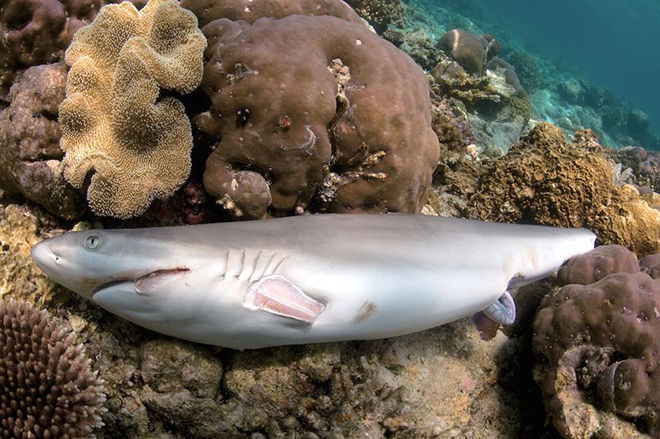The Shocking Truth Behind the Shark Fin Trade in Hong Kong
- Sophie Pettit

- Feb 7, 2018
- 4 min read
Updated: Feb 17, 2023
As the Hong Kong Maritime Museum gears up to host On Sharks & Humanity, a powerful new art exhibition that raises awareness of the negative impact of the shark fin trade, we speak with the Hong Kong Shark Foundation to reveal the shocking reality of the issue in Hong Kong and bust some dangerous myths along the way.

Walk into any banquet hall in Hong Kong and pick up a menu and chances are Shark Fin Soup will make an appearance. Ordered as a symbol of wealth, respect, and generosity to guests, the traditional dish is consumed to mark a celebration, dating back to the Song Dynasty (960AD-1279AD) when it was consumed by emperors and the wealthy. But the truth is, the custom is still very much alive in Hong Kong today – and it goes way beyond marking special occasions.
Some Shocking Statistics
A survey released by the Hong Kong Shark Foundation in January 2016 revealed that over 98 percent of the 375 restaurants surveyed in Hong Kong serve shark fin soup, some of which have already promised to be shark-free. A more recent survey in May 2017 showed that all 23 Chinese restaurant groups in Hong Kong are serving shark fin soup, five of which are promoting shark fin from threatened species. This goes against common assumptions that shark fin consumption is on the decline in the region – in fact, over 50 percent of the world’s shark fins are traded through Hong Kong, and 5,600 tonnes were imported in 2016 alone.
These are pretty frightening statistics, given that over 100 million sharks are caught worldwide for their fins and other products, often related to illegal, unregulated, and unreported (IUU) fishing and using cruel methods where they are caught, sliced at the fin, and thrown back into the sea to die a slow, painful death. It’s even more shocking to learn that 85 percent of the menus that serve the product are heavily linked to species threatened with extinction, which currently sits at 25 percent.

Fighting for Change
The Hong Kong Shark Foundation has been working hard to change the tide by reducing the consumption of shark fin in Hong Kong and raising awareness about shark conservation through campaigning, educating school children, and government lobbying. However, with no regulation on shark consumption in Hong Kong, and no guarantee that the products served in our city’s restaurants do not fall under the “endangered” category, it seems that the power to change the situation for the better lies with our city’s people – a message the Foundation is striving to convey.
“Hong Kong people are consuming a lot more shark fin than we think,” says Prentice Koo, head of the campaign for the Hong Kong Shark Foundation. “We believe that the public may not be “walking the talk” and passively consuming shark fin since it’s on nearly all set menus we surveyed. We call on the Hong Kong public to help conserve these important marine species and send a strong signal to the retailers of shark fin, by demanding shark fin-free menus and by not consuming shark fin soup.”
Busting Some Dangerous Myths
According to Koo, one of the main reasons that Hongkongers may not be “walking the talk” are the myths that surround shark fin soup, so in the name of conservation, we decided to help bust them:
Myth #1: There is an abundance of sharks in the ocean, and they are dangerous to humans
Truth: Each year, on average only 6 humans are killed by sharks, versus 100 million sharks killed. Humans need healthy oceans as a source of food, a way of supporting livelihoods and a means of regulating our climate e.g. approx 50 percent of our world’s oxygen comes from the oceans.
Myth #2: Shark fins taste good and are healthy for you
Truth: Shark fin has no taste or nutritional value. The stock (usually chicken) is responsible for the taste, while the shredded shark fins are only added for texture which can be easily replaced. Serving shark fin soup may be a sign of wealth but it comes at a price that our oceans cannot afford.
Myth #3: There is nothing we can do
Truth: Hong Kong has the power to change. Around 50 percent of the world’s shark fin is traded in Hong Kong, so if the people of Hong Kong make a stand against shark fin, the whole world will listen. Today, 78 percent of Hongkongers find it acceptable NOT to serve shark fin soup at a wedding banquet, and 85 percent express support for a ban on the import of shark fin into Hong Kong.
It’s up to Hongkongers to make a change …
About the Exhibition
Presented by Parkview Arts Action and co-curated by the Hong Kong Maritime Museum, in partnership with international non-profit organisation WildAid, On Sharks & Humanity is a powerful exhibition that brings together 36 top international contemporary artists who have joined forces to raise awareness of the negative impact of the shark fin trade. The first of its kind, the exhibition aims to raise public awareness of shark conservation in Hong Kong and the Greater Pearl River Delta region.
The exhibition is open to the public from June 29 until the end of September at the Hong Kong Maritime Museum, Central Pier No. 8. Tickets cost $30 for adults and $15 for students and seniors. Click here for more information.



Comments